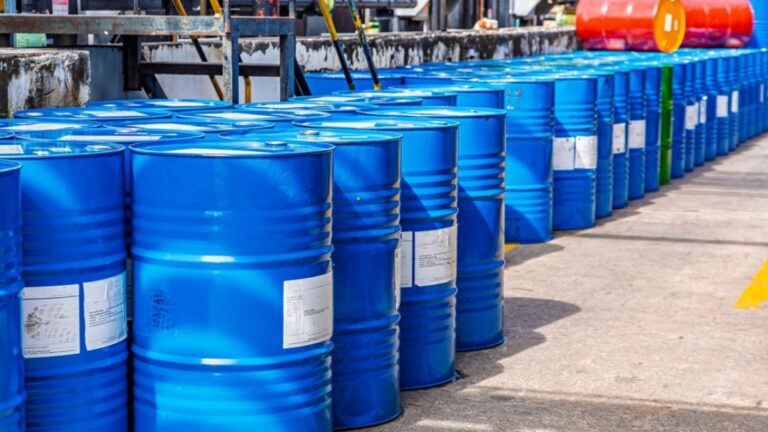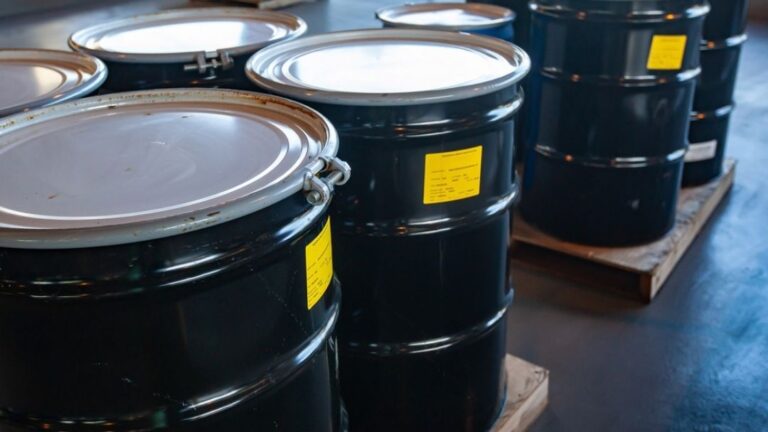Why 55-Gallon Drum Recycling is Key for Space Optimization
- Jonathan R.
- September 11, 2024
Table of Contents
A 55-gallon drum is common in industries ranging from manufacturing to agriculture, but managing the space these drums take up can be a real challenge.
As industries grow, the need for efficient space management becomes even more critical. That’s where recycling comes in.
Recycling 55-gallon drums helps reduce waste and frees up valuable storage space, making it a smart solution for any business looking to optimize its operations.
Next, we’ll explore how drum recycling is crucial in space optimization and why it’s a key strategy for many industries. Let’s take a look.
Importance of 55-gallon Drum Recycling
First off, recycling 55-gallon drums reduces the amount of waste that ends up in landfills.
Instead of tossing out old plastic, steel, or fiber drums, they can be reused or repurposed. This helps reduce contamination and makes sure fewer materials go to waste.
Another bonus? Reusing these drums cuts down on the carbon footprint.
By using recycled or reconditioned drums for transporting goods, businesses lower the demand for new drum production. This saves energy and reduces the overall environmental impact, which is a win for the planet.
Economic Efficiency
Recycling 55-gallon drums isn’t just good for the environment—it’s also good for the wallet.
Businesses can save money using recycled or reconditioned drums instead of buying new ones.
These reconditioned drums are cleaned and restored to meet industry standards, making them as good as new ones but at a lower price.
Plus, companies can cut down on storage and disposal costs. Holding onto significant amounts of unused drums takes up a lot of space.
By recycling them, businesses avoid the need to store or dispose of extra containers, saving space and money.
Resource Conservation
Recycling also helps conserve valuable resources.
When companies reuse 55-gallon drums, they reduce the need for raw materials to make new ones.
This fits perfectly with the circular economy, where materials are used for as long as possible.
Using recycled or reconditioned drums helps businesses meet their specific needs while showing that they care about environmental stewardship.
It’s a great way for them to show their commitment to sustainability while still having access to a wide selection of drum options.
Impact on Space Optimization
Recycling 55-gallon drums helps free up valuable storage space.
Businesses can recycle unused or discarded plastic drums, steel drums, or fiber drums instead of letting them pile up in a warehouse.
This means they don’t have to deal with large quantities of unwanted containers, which can take up too much space. By recycling, companies create more space for important things, like products and tools.
On the other hand, keeping or “hoarding” old drums can quickly lead to clutter. If these drums aren’t going to be reused or repurposed, they end up just taking up room and getting in the way.
Recycling solves this by ensuring the drums are put to good use rather than just sitting there, wasting space.
Improved Warehouse Efficiency
By recycling old drums, businesses can improve the overall efficiency of their warehouses.
When there’s less clutter from unused or broken drums, the workflow improves. Workers can move around more efficiently, and finding the right tools and materials becomes faster.
Many companies have already seen the benefits of drum recycling. For example, some industries have noticed better transportation and material handling after clearing out old barrels through recycling programs.
By making recycling a regular part of their process, they’ve boosted efficiency and saved money on storage.
Customizable Storage Solutions
Another great benefit of recycled drums is their versatility; businesses can repurpose them for alternative storage applications.
For instance, old drums can be used to organize tools, store small parts, or as durable containers for bulk materials. Their size and strength make them perfect for various uses in the warehouse.
Additionally, recycled drums can be adapted into stackable or collapsible designs, making them even more space-saving.
These customizable features allow businesses to get creative with how they use their drums, whether for hazardous materials, chemical storage, or general-purpose containers.
Recycling Processes and Their Effect on Space Utilization
Before recycled drums can be used again, they need to be correctly cleaned and refurbished.
This process helps remove any old residues or contaminants, ensuring that the drums meet industry standards for safe use.
Once cleaned, they can be repurposed and used in various industries, from food to chemical storage.
By reconditioning these drums, businesses can avoid the unnecessary buildup of damaged or unusable containers.
This leads to significant space savings, as reconditioned drums can be returned to use instead of sitting in storage waiting to be disposed of.
In the long run, this keeps warehouses clutter-free and more efficient.
Conversion into Usable Materials
Recycling facilities can still use drums that can’t be refurbished by breaking them down into raw materials.
Steel and plastic drums can be shredded, melted, or repurposed into new products. This process reduces waste and saves space by transforming large, bulky drums into smaller, more manageable materials.
By converting old drums into new materials, companies reduce the overall volume of waste they need to handle. Instead of filling up landfills, the drums get a second life as something new and useful.
This process aligns with the company’s commitment to environmental stewardship and sustainability.
Industry Applications
Recycling 55-gallon drums isn’t just a space-saving solution; it has practical benefits across multiple industries:
Manufacturing Sector
Manufacturers often purchase large quantities of 55-gallon drums to store chemicals, oils, and other raw goods.
Drum recycling helps manufacturers optimize their storage space and reduce costs. Instead of keeping old drums lying around, recycling allows them to free up space for new production materials.
Additionally, using recycled drums can be much cheaper than purchasing new ones, helping companies save money on storage and material handling.
For example, a manufacturing company might regularly recycle its steel drums, cleaning and reconditioning them for reuse.
This process saves storage space and reduces the need to constantly buy new drums, making operations more efficient and cost-effective.
Agriculture and Chemical Industries
In agriculture, recycled drums are essential for storing seeds, fertilizers, and chemicals.
Poly drums are instrumental because they’re durable and resistant to harsh weather, making them perfect for farm outdoor storage.
Instead of letting old drums pile up, farms can reuse these containers year after year, maximizing their storage space while keeping costs down.
Drum recycling is a crucial space-saving solution in the chemical industry. Chemical plants handle large amounts of hazardous substances, and recycling their plastic or steel drums ensures that old containers don’t clutter the facility.
Many chemical plants have adopted recycling initiatives that help with waste management and improve compliance with safety and environmental regulations.
Construction and Heavy Industries
The construction industry frequently uses heavy-duty drums to store and transport materials such as concrete additives, lubricants, and hazardous chemicals.
Recycling these drums helps construction companies save space on job sites. Instead of letting used drums take up space, they are recycled or repurposed for other projects. This keeps the worksite organized and improves efficiency.
A construction company, for example, can reduce its disposal costs by setting up a drum recycling program. Recycling large barrels and drums can save space and reduce waste.
Challenges and Solutions in 55-Gallon Drum Recycling
Of course, recycling these drums also comes with its fair share of challenges:
Handling Hazardous Materials
Recycling drums that have held hazardous materials come with safety challenges.
Special protocols must be followed to ensure these drums are cleaned and handled properly.
For example, steel drums used for chemical storage must be thoroughly cleaned and removed from harmful residues before being recycled or reused. Failing to do this can pose safety risks for workers and the environment.
To address this, companies often partner with specialized services that handle the safe disposal of hazardous drums.
These services ensure that the containers are treated properly and that space is used efficiently without endangering safety.
Storing hazardous drums until recycled is also easier when companies implement proper storage protocols to minimize risks and free up space.
Limited Recycling Facilities
One of the main challenges industries face is the lack of access to recycling facilities in certain areas.
Some regions may not have the infrastructure to process large quantities of plastic or steel drums. This can make it difficult for companies to implement recycling programs and optimize their space.
Partnering with specialized recycling companies that offer pickup services and can handle recycling logistics even in remote locations can solve this problem.
These companies help industries make the most of their available space by ensuring drums are correctly disposed of and reused.
This is a practical way for industries in areas with limited access to maintain environmental stewardship while optimizing space.
Conclusion
As you can see, recycling 55-gallon drums is smart for the environment and your bottom line.
Despite some challenges, solutions like specialized services and recycling programs help industries, whether in manufacturing, agriculture, or construction, benefit from these efforts.
Ready to optimize your space and take advantage of drum recycling’s benefits? CTI Safety Storage has the solutions to streamline your recycling process and keep your operations running smoothly.
Get in touch with us today to start maximizing your space.

Jonathan Reed
Jonathan Reed specializes in writing in-depth, data-driven content on industrial waste management, regulatory compliance, and environmental sustainability. With expertise in hazardous waste disposal, OSHA guidelines, and waste reduction technologies, he provides actionable insights for businesses navigating complex waste management challenges.



